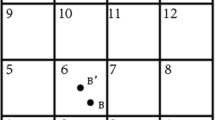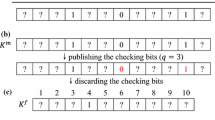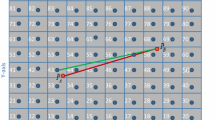Abstract
Quantum secure multi-party geometry computation is a specific primitive of classical secure multi-party computation. Compared with classical secure multi-party geometry computation based on mathematical difficulty problems which have been potentially threatened due to the development of quantum computer technology, the quantum protocol can provide unconditional security for the geometry computation. A novel quantum protocol based on the mutually biased bases of d-level quantum system is constructed to perform secure two-party Euclidean distance computation. With the aid of a semi-honest third party, the proposed protocol can calculate the Euclidean distance between two secret n-dimensional coordinates held by the participants who do not trust each other. Not only can the protocol resist the attacks from both outside eavesdroppers and participants, but also from semi-honest third party who does not collude with any participant.
Similar content being viewed by others
References
Yao, A.C.: Protocols for secure computations, In: Proc. of the 23rd Annual IEEE Symposium on Foundations of Computer Science, pp. 160–164 (1982)
Goldreich, O., Micali, S., Wigderson, A.: How to play any mental game, In: Proc. of the Nineteenth Annual ACM Symposium on Theory of Computing , pp. 218–229 (1987)
Katz, J.: On achieving the “best of both worlds” in secure multiparty computation, In: Proc. of the 39th Annual ACM Symposium on Theory of Computing , pp. 10–20 (2007)
Gordon, S.D., Hazay, C., Katz, J., Lindell, Y.: Complete fairness in secure two-party computation, In: Proc. of the 40th Annual ACM Symposium on Theory of Computing , p. 413 (2008)
Atallah, M.J., Du, W.: Secure multi-party computational geometry, In: the 7th International Workshop on Algorithms and Data Structures , pp. 165–179 (2001)
Li, S.D., Wang, D.S., Dai, Y.Q.: Efficient secure multiparty computational geometry. Chin. J. Electron. 19(2), 324–328 (2010)
Li, S.D., Wu, C.Y., Wang, D.S., Dai, Y.Q.: Secure multiparty computation of solid geometric problems and their applications. Inf. Sci. 282, 401–413 (2014)
Chen, Z.H., Li, S.D., Huang, Q., Ding, Y., Sun, M.: Privacy-preserving determination of spatial location-relation in cloud computing. Chin. J. Comput. 40(2), 351–363 (2017)
Li, S.D., Dai, Y.Q.: Secure two-party computational geometry. J. Comput. Technol. 20(2), 258–263 (2005)
Yang, B., Sun, A.D., Zhang, W.Z.: Secure two-party protocols on planar circles. J. Inform. 8(1), 29–40 (2011)
Shor, P.: Algorithms for quantum computation: discrete logarithms and factoring, In: Proc. of 35th Annual Symposium on the Foundations of Computer Science (Los Alamitos, CA), pp. 124–134 (1994)
Grover, L.K.: A fast quantum mechanical algorithm for database search, In: Proc. of the 28 Annual ACM Symposium On Theory Of Computing , pp. 212–219 (1996)
Bennett, C.H., Brassard, G.: Quantum cryptography: public key distribution and coin tossing, In: Proc. of IEEE International Conference on Computers (Bangalore, Indian), pp. 175–179 (1984)
Yang, Y.G., Wen, Q.Y.: An efficient two-party quantum private comparison protocol with decoy photons and two-photon entanglement. J. Phys. A Math. Theor. 42(5), 055305 (2009)
Jia, H.Y., Wen, Q.Y., Song, T.T., Gao, F.: Quantum protocol for millionaire problem. Opt. Commun. 284(1), 545–549 (2011)
Gao, F., Qin, S.J., Huang, W., Wen, Q.Y.: Quantum private query: a new kind of practical quantum cryptographic protocol. Sci. China Phys. Mech. Astron. 62(7), 070301 (2019)
Wei, C.Y., Cai, X.Q., Wang, T.Y., Qin, S.J., Gao, F., Wen, Q.Y.: Error tolerance bound in QKD-based quantum private query. IEEE J. Sel. Areas Commun. 38(3), 517–527 (2020)
Peng, Z.W., Shi, R.H., Zhong, H., Cui, J., Zhang, S.: A novel quantum scheme for secure two-party distance computation. Quantum Inf. Process. 16(12), 316 (2017)
Peng, Z.W., Shi, R.H., Wang, P.H., Zhang, S.: A novel quantum solution to secure two-party distance computation. Quantum Inf. Process. 17(6), 145 (2018)
Durt, T., Englert, B.G., Bengtsson, I., Życzkowski, K.: On mutually unbiased bases. Int. J. Quantum Inform. 8(4), 535–640 (2010)
Ivanovic, I.D.: Geometrical description of quantal state determination. J. Phys. A: Math. Gen. 14(12), 3241 (1981)
Yang, Y.G., Xia, J., Jia, X., Hua, Z.: Comment on quantum private comparison protocols with a semi-honest third party. Quantum Inf. Process. 12(2), 877–885 (2013)
Li, C.Y., Zhou, H., Wang, Y., Deng, F.G.: Secure quantum key distribution network with bell states and local unitary operations. Chin. Phys. Lett. 22(5), 1049–1052 (2005)
Gao, F., Qin, S.J., Wen, Q.Y., Zhu, F.C.: A simple participant attack on the Bradler-Dusek protocol. Quantum Inform. Comput. 7(4), 329–334 (2007)
Acknowledgements
This work was supported in part by the RFDP of Henan Polytechnic University (Grant: B2013-054).
Author information
Authors and Affiliations
Corresponding author
Additional information
Publisher's Note
Springer Nature remains neutral with regard to jurisdictional claims in published maps and institutional affiliations.
Rights and permissions
About this article
Cite this article
Cao, Y. Quantum secure two-party Euclidean distance computation based on mutually unbiased bases. Quantum Inf Process 21, 262 (2022). https://doi.org/10.1007/s11128-022-03611-9
Received:
Accepted:
Published:
DOI: https://doi.org/10.1007/s11128-022-03611-9




